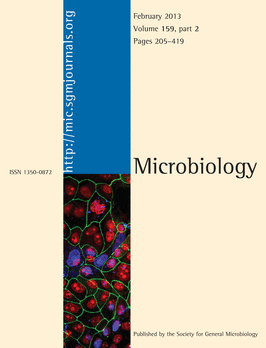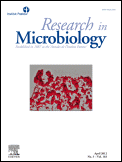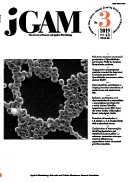
Microbial Physiology
Scope & Guideline
Fostering Discoveries for Health and Sustainability
Introduction
Aims and Scopes
- Microbial Metabolism and Physiology:
Research exploring the metabolic pathways and physiological adaptations of microorganisms under various environmental conditions, including stress responses and nutrient acquisition. - Microbial Ecology and Community Interactions:
Studies on microbial diversity, community structure, and interactions within ecosystems, highlighting the roles of microorganisms in ecological contexts. - Genomic and Molecular Mechanisms:
Investigations into the genetic and molecular bases of microbial function, including gene regulation, protein interactions, and the effects of genome structure on physiology. - Biotechnological Applications of Microorganisms:
Research aimed at harnessing microbial processes for practical applications in industry, agriculture, and environmental management, including enzyme production and bioremediation. - Pathogenicity and Antibiotic Resistance:
Studies examining the mechanisms of microbial pathogenicity, virulence factors, and the dynamics of antibiotic resistance among microbial populations.
Trending and Emerging
- Omics Technologies in Microbial Research:
There is a significant trend towards utilizing omics technologies (genomics, proteomics, metabolomics) to gain comprehensive insights into microbial physiology and interactions. - Microbial Stress Responses and Adaptations:
An increased focus on how microorganisms adapt to environmental stresses, including UV radiation and nutrient availability, showcases the importance of resilience in microbial life. - Microbial Interactions and Ecological Dynamics:
Emerging themes emphasize the complex interactions within microbial communities, including competition, predation, and symbiosis, which are critical for understanding ecosystem functions. - Biotechnological Innovations for Sustainable Practices:
Research is increasingly directed towards innovative biotechnological applications, such as bioremediation and bioengineering, to address environmental challenges and promote sustainability. - Role of Microbes in Human Health:
A growing interest in the relationship between microbial communities and human health, particularly in understanding the gut microbiome and its implications for disease and nutrition.
Declining or Waning
- Traditional Antibiotic Discovery:
Research focused solely on the discovery of new antibiotics from microbial sources has diminished, likely due to a broader focus on multi-faceted approaches to combat antibiotic resistance. - Classical Microbial Taxonomy:
Studies primarily aimed at the classification and identification of microbial species based on morphological characteristics are becoming less frequent, as molecular and genomic techniques gain precedence. - Single-Organism Studies:
Research concentrating exclusively on single microbial species without considering ecological or community contexts is declining, reflecting a shift towards understanding microbial interactions.
Similar Journals

Microorganisms
Unveiling the mysteries of microbial life.Microorganisms is a leading open-access journal published by MDPI based in Switzerland, catering specifically to the rapidly evolving fields of microbiology and virology. Since its inception in 2013, the journal aims to foster the dissemination of high-quality research through its comprehensive and interdisciplinary platform, with a particular focus on both fundamental and applied microbiological sciences. Contributing to its esteemed reputation, Microorganisms holds a commendable Q2 ranking in the categories of Microbiology and Virology, as well as in Medical Microbiology, highlighting its significance in the academic community. With a consistent impact, evidenced by its rankings in Scopus—such as rank #25 in Virology and #56 in Microbiology—the journal serves as an invaluable resource for researchers, professionals, and students looking to stay at the forefront of microbiological research. As an open-access journal, Microorganisms ensures that vital research findings are readily available to a global audience, promoting collaboration and innovation in the study of microbial life and its implications for health and disease.

MICROBIOLOGY-SGM
Connecting researchers to the forefront of microbiological science.MICROBIOLOGY-SGM, published by the esteemed MICROBIOLOGY SOC in the United Kingdom, is a pioneering journal dedicated to advancing the field of microbiology. With its ISSN 1350-0872 and E-ISSN 1465-2080, the journal serves as a vital platform for researchers, professionals, and students to disseminate significant findings and engage in the latest developments in microbiology. Since its inception in 1994, MICROBIOLOGY-SGM has upheld rigorous academic standards, demonstrated by its position in the Q2 quartile of the 2023 Scopus category for Microbiology, ranking #108 out of 182. While traditionally not an open-access journal, it offers a rich selection of articles that address a variety of topics within the microbiological sciences. As we approach 2024, the journal continues to foster collaboration and knowledge exchange, making it an indispensable resource for those at the forefront of microbiological research.

RESEARCH IN MICROBIOLOGY
Fostering innovation in microbiology for a global audience.Research in Microbiology, published by Elsevier, is a prominent academic journal devoted to advancing the field of microbiology, encompassing a diverse array of topics including immunology, molecular biology, and biochemistry. Established in 1987, the journal has expanded its focus over the years, with a commendable impact factor reflecting its relevance and influence in the scientific community. Although it does not currently offer open access options, Research in Microbiology remains a crucial resource for researchers and professionals seeking to stay abreast of the latest findings and methodologies. The journal holds a respectable Q2 ranking in Medicine (miscellaneous) and a Q3 ranking in both Microbiology and Molecular Biology for 2023, highlighting its position within the scholarly landscape. With its base in France and accessible to a global audience, Research in Microbiology continues to foster scholarly exchange, making it an essential platform for the dissemination of impactful microbiological research.

Frontiers in Microbiology
Unlocking the Secrets of Microbial LifeFrontiers in Microbiology is a leading open-access journal published by Frontiers Media SA, available since 2010, and based in Switzerland. As a prominent platform for innovative research, it specializes in microbiology and medical microbiology, marked by its impressive Q1 classification in the respective fields, reflecting its significant impact and relevance in advancing microbial sciences. With a Scopus ranking of 49th in Microbiology and 41st in Medical Microbiology, this journal is positioned among the top-tier publications, catering to a diverse audience of researchers, professionals, and students. The journal aims to disseminate groundbreaking findings and foster discussions that drive the field forward, ensuring a comprehensive coverage of microbiological studies, from basic research to applications in healthcare and beyond. Enjoy unrestricted access to cutting-edge articles that contribute to both theoretical and applied aspects of microbiology, enriching the scientific community's knowledge base.

WORLD JOURNAL OF MICROBIOLOGY & BIOTECHNOLOGY
Transforming Science Through Microbiology and BiotechnologyWORLD JOURNAL OF MICROBIOLOGY & BIOTECHNOLOGY, published by Springer, serves as a pivotal forum for advancing the fields of microbiology and biotechnology since its inception in 1990. Located in the Netherlands, this esteemed journal has secured a prominent position in the academic landscape, recognized for its strong impact factor and prestigious Q2 category rankings across disciplines such as Applied Microbiology, Biotechnology, and Physiological Sciences. Researchers and professionals utilize this journal to disseminate innovative findings and explore emerging technologies that are transforming the scientific landscape. With a robust submission rate and high visibility among the academic community, the journal fosters interdisciplinary collaboration, encouraging discussions that bridge gaps between theory and practical applications. As it converges into 2024, the WORLD JOURNAL OF MICROBIOLOGY & BIOTECHNOLOGY continues to be a vital resource for scholars aiming to enhance our understanding of microbial processes and biotechnological advances.

JOURNAL OF GENERAL AND APPLIED MICROBIOLOGY
Unveiling the microscopic world for practical solutions.JOURNAL OF GENERAL AND APPLIED MICROBIOLOGY, published by the MICROBIOL RES FOUNDATION, is a vital resource in the fields of applied microbiology and biotechnology, as well as in diverse medical applications, serving an academic community dedicated to advancing microbial science. Established in 1955, this journal has a rich history of disseminating innovative research and insights into the intricate world of microorganisms. With an ISSN of 0022-1260 and an E-ISSN of 1349-8037, the journal maintains high scholarly standards and robustness, reflected in its 2023 Scopus rankings placing it in the Q3 and Q4 quartiles within its categories. While primarily based in Japan, the journal engages a global audience, offering valuable contributions that inform both theoretical perspectives and practical applications in microbiology. Despite being a non-open-access publication, it provides pivotal research findings essential for academics, professionals, and students alike, fostering a deeper understanding of microbial impact on health and the environment.

APPLIED BIOCHEMISTRY AND MICROBIOLOGY
Fostering Knowledge in the Dynamic Fields of Biochemistry and Microbiology.Applied Biochemistry and Microbiology is an esteemed journal published by Pleiades Publishing Inc, focusing on the intricate intersections of biochemistry and microbiology. Established in 1970, with a commitment to advancing scientific knowledge, this journal serves as a vital platform for disseminating innovative research findings in applied microbiology, biotechnology, and biochemistry. With its ISSN 0003-6838 and E-ISSN 1608-3024, the journal operates from its base in New York, USA. As a recognized publication in the field, Applied Biochemistry and Microbiology holds a Category Quartile ranking of Q3 in Applied Microbiology and Biotechnology and Q4 in Biochemistry, reflecting its significant contributions and relevance. Although currently not open access, the journal is indexed in Scopus, with respectable rankings that highlight its impact in the community, making it a pivotal resource for researchers and professionals dedicated to the realms of biochemistry and microbiology.

JOURNAL OF BASIC MICROBIOLOGY
Unveiling the Secrets of Microbial LifeJOURNAL OF BASIC MICROBIOLOGY is a premier publication in the field of microbiology, published by WILEY since 1985. With a significant presence in Germany, this journal encompasses a wide spectrum of research topics, focusing on applied microbiology and biotechnology as well as diverse areas within medicine. Holding a commendable Q2 ranking in both its categories for 2023, it plays a crucial role in disseminating innovative findings and methodologies to the community. Researchers will find it to be an essential platform for sharing high-quality work, where it currently stands at rank #47 in the applied microbiology and biotechnology category, representing the 63rd percentile among international journals. The JOURNAL OF BASIC MICROBIOLOGY caters to a growing audience of professionals and students, offering insights essential for advancement in microbiological research and its applications. While it does not currently offer an Open Access option, it remains an influential outlet for academic excellence, continuously contributing to the development of the field through its rigorous peer-reviewed articles.

ARCHIVES OF MICROBIOLOGY
Fostering Innovation in Microbial ResearchThe Archives of Microbiology, published by Springer, is a reputable journal in the field of microbiology, serving as a vital platform for the dissemination of groundbreaking research and critical reviews since its inception in 1974. With an ISSN of 0302-8933 and an E-ISSN of 1432-072X, this journal operates out of Germany and maintains a global reach, promoting high-quality scholarship across multiple disciplines, including biochemistry, genetics, and molecular biology, as evidenced by its Q2 ranking in Medicine (miscellaneous) and consistent Q3 placements in other categories in 2023. Although the journal does not offer open access options, its rigorous peer-review process ensures that published articles are of the highest standard, making it an essential resource for researchers, professionals, and students keen on advancing their understanding of microbial sciences. As the journal converges toward 2024, it remains committed to fostering innovative microbiological research and facilitating interdisciplinary dialogue within the scientific community.

MOLECULAR MICROBIOLOGY
Illuminating the Molecular World of MicrobesMOLECULAR MICROBIOLOGY is a prestigious academic journal published by Wiley that has been at the forefront of research in the fields of microbiology and molecular biology since its inception in 1987. With an impressive Q1 rating in Microbiology and a Q2 rating in Molecular Biology for 2023, this journal serves as a vital platform for disseminating high-impact research that advances our understanding of microbial processes and interactions at the molecular level. The journal's ISSN is 0950-382X, and the E-ISSN is 1365-2958, making it easily accessible to a global audience of researchers, professionals, and students. Though not an Open Access journal, MOLECULAR MICROBIOLOGY remains committed to providing valuable insights and fostering knowledge exchange in the academic community. Situated in the United Kingdom and indexed in prominent databases like Scopus, the journal holds a strong standing, with current rankings reflecting its influential role in the academic landscape. Researchers in the field are invited to contribute and engage with cutting-edge discoveries that will shape the future of microbiological sciences.